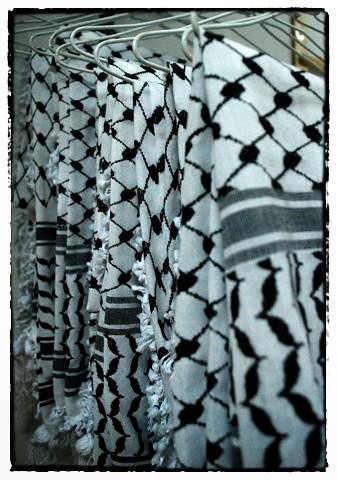Hirbawi Textile Factory
The last and only Kufiya factory in Palestine - photo reportage

Hirbawi Textile Factory produces Kufiya, the iconic patterned scarves worn around the Middle East. The factory is “the only and the last” to produce Kufiya in Palestine, says manager Abdul Hirbawi with some pride. Other countries in the Middle East where the Kufiya is popular, like Jordan or Syria, produce their own -slightly different- versions. Hirbawi is the only factory in Palestine producing the original Kufiya, which usually awaits sale in the factory's small backroom shop.

Hirbawi Textile is located in the city of Hebron, (known in Arabic as Al-Khalil) the biggest city in Palestine's West Bank. Hebron has been a hot spot in the conflict between Palestine and Israel. Extremist Israelis have settled in the center of Hebron, leading to almost daily violence between settlers, Israeli soldiers, and Palestinian residents. The factory is unassuming, tucked away on a quiet residential street.

Inside the factory, fifteen industrial looms (both working and non-working) fill half of the florescent-lit warehouse. The working machines thump in constant motion, creating an insistent roar inside the building. The factory now runs only half the machines because sales have been in steady decline since the 1990s.

The factory was started over 50 years ago by Yassar Hirbawi, and is now run by his three sons and a family friend. Peering over spools of thread are Abid Keraki (left), the long-time friend of the Hirbawi family, and Izzat Hirbawi.

The traditional Palestinian kufiya is this black-and-white pattern, which makes up over 70 percent of the factory’s sales. The black-and-white kufiya is often referred to as the unofficial Palestinian flag, and carries deep meaning for many who wear it. There are numerous stories about the origin of the kufiya’s pattern. It is said to represent a fishing net, a honeycomb, the joining of hands, or the marks of dirt and sweat wiped off a worker’s brow, among other things.

Factory founder Yassar Hirbawi relaxes with a cigarette in the factory's small backroom shop. Behind him hang a sampling of his factory's Kufiyas, as well as key-chains for sale. He says Kufiya is more popular than ever in Palestine. During the first Intifada, many avoided wearing it for fear of being arrested. But now, Kufiya is worn as a symbol of Palestinian culture and heritage. He adds: “It’s our past, future…It means everything”.

2011 was the Hirbawi Factory’s 50th anniversary. Yassar Hirbawi started the factory at age 33, and began training his sons because his aim is that the factory remains family-run.

Factory Manager Abdulla Hirbawi gestures in front of the Palestinian flag, while talking about the factory’s struggles. Sales are dropping due to cheaper, though inferior, foreign-made imports, he says.

Learning the looms is detailed work. The machines must be monitored constantly to make sure the finished products are fit for sale. Yassar Hirbawi says it took him nine years to learn every part in the machines. Here, his son Izzat carefully trims the extraneous threads from a colorful kufiya-in-progress.

Together with Kufiya.org Hirbawi develops new designs to produce modern Kufiya in trendy colors and make it an everyday fashion item.

Even with their father to teach them, it took the Hirbawi brothers more than five years to fully understand the complex industrial looms.

Abid Keraki works to loosen tangled thread, and get a loom back up and running. The men do all the repair work on the machines themselves. They say they will train only one of Yassar’s six grandchildren to run the factory. It is more important for the rest to go to university.

While a loom pounds out a traditional black-and-white kufiya, Abid Keraki holds a thread in his mouth as he quickly replaces a spool. The eight operational looms require constant attention.

A street vendor in Bethlehem offers foreign-made kufiyas to a group of tourists. Because kufiyas imported to the West Bank are typically loosely woven from cheaper material, they can cost a quarter of the price of an original kufiya.

Poorly produced imported kuffiya hangs outside a shop in Bethlehem. Yassar Hirbawi says that while the popularity of the kufiya is increasing, his factory's sales are down dramatically, due to cheaper imports, primarily from China.

Yassar Hirbawi ponders the future of the factory he founded in 1961. He describes working in the factory as a “battle,” as he and his family struggle to compete with cheaper kufiya producers across the globe. He concludes: “But what can we do? It’s our work and our life, and, if God will, we will never stop producing original kufiyas made in Palestine.”
all rights @Palestine Speaks






























